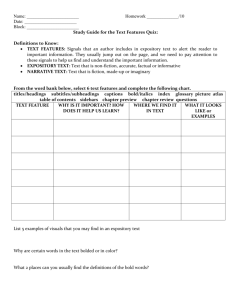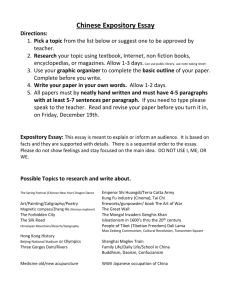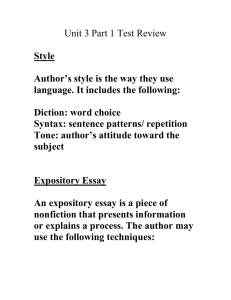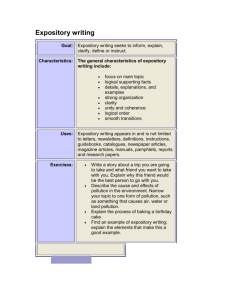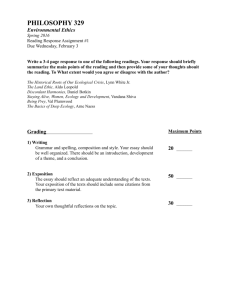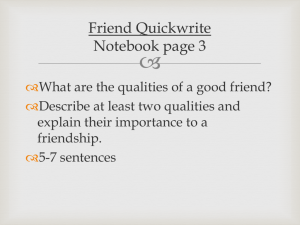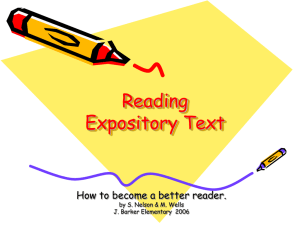RW PowerPoint
advertisement
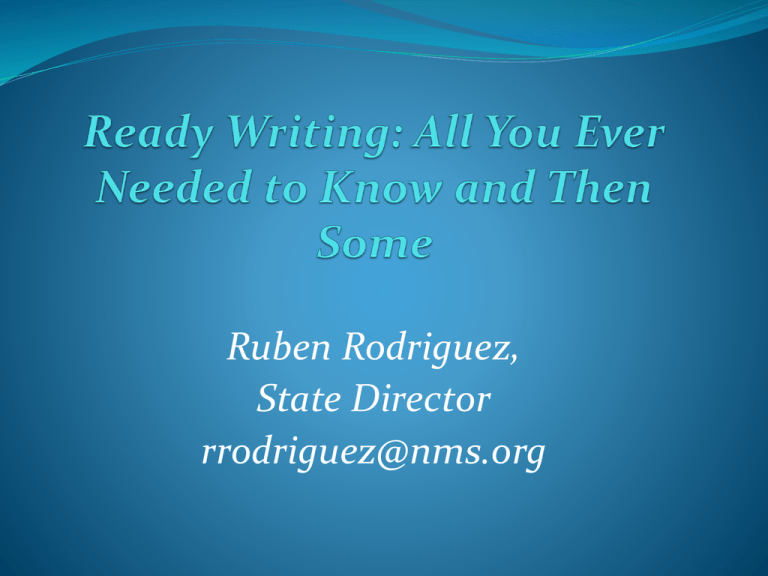
Ruben Rodriguez, State Director rrodriguez@nms.org “People on the outside think there’s something magical, that you go up in the attic at midnight and cast the bones and come down in the morning with a story, but it isn’t like that. You sit in back of the typewriter and you work, and that’s all there is to it.” --Harlan Ellison American Writer What is READY WRITING? READY WRITING is a two-hour event in which contestants write an expository essay on one of two prompts. READY WRITING, the term, comes from the idea that good writers, like good extemporaneous speakers, should be prepared to write well on a wide variety of subjects without prior preparation. Simply, contestants should be READY to write. What is EXPOSITORY WRITING? Expository Writing explains, proves, explores, or informs. Exposition explains a writer’s ideas or opinions on a subject. Exposition is one of the four basic types of writing along with description, narration, and argumentation. To an extent exposition is a combination of all of the types of writing. The primary focus of exposition is on the TOPIC, unlike an argument where the focus is on audience whereas in creative writing, the focus is on self. What are the PROMPTS like? Prompt topics are timeless, rather than timely. As writers you should be “active” readers. Read always— newspapers, magazines, on-line articles, opinion editorials. Listen to NPR, watch the news, and programs such as “60 Minutes,” “20/20,” and “Meet the Press.” *It is key you know what is going on in your community, in Texas, in the United States, and in the World. Prompts deal with such broad categories as Sociology, Education, Family/Lifestyles, Science/Environment, Arts, Sports, etc. Why Compete in Ready Writing? • Practice writing under the pressure of a time limit, much like post-graduate college entrance exams (PSAT, AP, SAT, ACT Exams). • The chance to take risks, and not harm your GPA. • The opportunity to have undivided attention given your writing, and receiving feedback on your work. • The possibility of scholarships. • The FUN of competition. *Simply, Expository Writing is the kind of writing you will likely use most often in years to come (exams, term papers, job reports, etc.) How Do I Prepare for Ready Writing? Suggestions from Writers at the State Meet: •Read, a lot: magazines, newspapers, quality classic and contemporary novels such as those suggested on the AP Language and Literature Exam Lists—focus especially on Non-Fiction. •Develop your own Unique Writing Style (“voice”). •Engage, often, in complex, stimulating conversations with your peers, teachers, parents. *Don’t forget that a “mind is a terrible thing to waste!” Getting Started: A Self-Inventory Answer the following Questions: •Which books have you gotten “lost in” in the last six months? •Have you read the daily newspaper four of the last seven days? What top three current events come to mind? •What three prominent figures come to mind? Why? •What are three or four “life” questions that consistently run through your mind? •What have you written recently that represented writing to “find out?” Poetry? Fiction? • What piece of FICTION have you read that “touched” you? Why? • What piece of NON-FICTION “touched” you? A speech, essay, opinion editorial? *Your responses to these questions will give you a solid foundation to work with when you begin to write expository essays required of you in Ready Writing since utilizing prior knowledge will be an asset to writing an effective essay. One Last Thought on Writing “I argue that as human beings we write to communicate, plan, petition, remember, announce, list, imagine . . . but above all, we write to hold our lives in our hands and to make something of them. Writing allows us to turn chaos into something beautiful, to frame selected moments, to uncover and celebrate the organizing patterns of our existence. As human beings we have a deep need to represent our experience. By articulating our experience, we reclaim it for ourselves.” --Lucy Calkins
